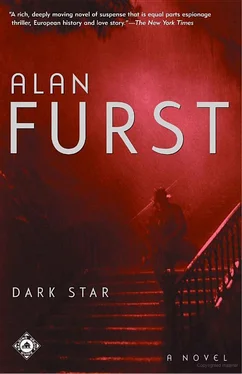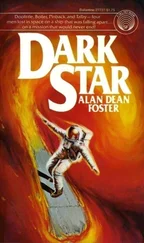Alan Furst - Dark Star
Здесь есть возможность читать онлайн «Alan Furst - Dark Star» весь текст электронной книги совершенно бесплатно (целиком полную версию без сокращений). В некоторых случаях можно слушать аудио, скачать через торрент в формате fb2 и присутствует краткое содержание. Жанр: Шпионский детектив, на английском языке. Описание произведения, (предисловие) а так же отзывы посетителей доступны на портале библиотеки ЛибКат.
- Название:Dark Star
- Автор:
- Жанр:
- Год:неизвестен
- ISBN:нет данных
- Рейтинг книги:3 / 5. Голосов: 1
-
Избранное:Добавить в избранное
- Отзывы:
-
Ваша оценка:
- 60
- 1
- 2
- 3
- 4
- 5
Dark Star: краткое содержание, описание и аннотация
Предлагаем к чтению аннотацию, описание, краткое содержание или предисловие (зависит от того, что написал сам автор книги «Dark Star»). Если вы не нашли необходимую информацию о книге — напишите в комментариях, мы постараемся отыскать её.
Dark Star — читать онлайн бесплатно полную книгу (весь текст) целиком
Ниже представлен текст книги, разбитый по страницам. Система сохранения места последней прочитанной страницы, позволяет с удобством читать онлайн бесплатно книгу «Dark Star», без необходимости каждый раз заново искать на чём Вы остановились. Поставьте закладку, и сможете в любой момент перейти на страницу, на которой закончили чтение.
Интервал:
Закладка:
“Then late.”
She hesitated. “I’ll be returning home …”
What? Then he understood there were people near the telephone. “Home from a restaurant?”
“No, it isn’t that.”
“Home to sleep.”
“It would be better.”
“What time is the dinner over?”
“One can’t rush away, I hope you’ll understand. It is a, it is an occasion, festive …”
“Oh.”
“Do you have to go away tomorrow?”
“It can’t be helped.”
“Then I don’t see how …”
“I’ll wait for you. Maybe there’s a way.”
“I’ll try.”
Just after eleven the doorbell rang. Szara raced downstairs, hurried past the landlady’s door-opened the width of an eye-and let her in. In the little room, she took off her coat. An aura of the cold night clung to her skin, he could feel it. She was wearing a midnight blue party dress, taffeta, with ruffles. The back was all tiny hooks and eyes. “Be careful,” she said as he fumbled. “I mustn’t stay too long. Here it is not done to leave a party.”
“What did you tell them?”
“That a friend was going away.”
It was not a magic night. They made love, but the tension in her did not break. Afterward she was sad. “Maybe I shouldn’t have come. Sweeter to have a memory of the snow.” With the tips of his fingers he pushed the hair back off her forehead. “I’ll never see you again,” she said. She bit her lip to keep from crying.
He walked her home, almost to the door. They kissed good-bye, dry and cold, and there was nothing to say.
In the late November of 1937, the Soviet merchant vessel Kolstroi shipped anchor in the port of Rostock, moved slowly up the Warnemunde inlet into Lubeck bay and, swinging north into the Baltic and setting a north-by-easterly course to skirt the Sasenitz peninsula and pass south of the Danish isle of Bornholm, made for Leningrad harbor, some eight hundred and forty nautical miles away.
The Kolstroi, heavily laden with machine tools, truck tires, and bar aluminum loaded at the French port of Boulogne, docked at Rostock only to complete its complement of eleven passengers bound for Leningrad. Moving up the Warnemunde in gathering darkness, the Kolstroi sounded its foghorn continually, joining a chorus of in-and outbound freighters as it reached Lubeck bay, where the Baltic fogbanks rolled in toward shore in the stiff northerly winds. Andre Szara and the other passengers were not allowed the freedom of the deck until the ship was beyond the German territorial limit. When Szara did seek the air, after the close quarters of the ship’s lounge where they were fed supper, there was little visibility, nothing of the lights on the German coast, only black water heaving in November swells and a building gale that drove iced salt spray onto the metal plates of the deck, where it froze into a lead-colored glaze. He bore it as long as he could, staring into the fog whipping past the ship’s lights, unable to see land.
The Kolstroi was Soviet territory; he’d bowed under the vast weight of it before they ever sailed, his possessions spread out on a table under the cold eyes of a security officer. The journalist Szara meant nothing to this one, Homo Stalinus, human as clock. He was thankful he had disposed of the Okhrana dossier before he left Berlin-memory itself was frightening in the atmosphere aboard the freighter.
The passengers were a mixed group. There were three English university students, with creamy skins and bright eyes, terribly earnest young men on a dream voyage to what they believed to be their spiritual homeland. There was one middle-age trade representative, suffering from an illness-attempted escape, Szara thought-who was dragged on board by NKVD operatives. The tips of his shoes scraped the wooden gangplank as they carried him onto the ship-obviously he had been drugged senseless. He was not the only passenger going home to die. They were a strange brotherhood, silent, self-contained, having abandoned themselves to a fate they deemed inevitable; the man who’d been dragged on board proved the futility of flight. They rarely slept, greedy for their remaining hours of introspection, pacing about the deck when they could stand the cold, their lips moving as they rehearsed imagined conversations with their interrogators.
Mostly they avoided one another. A conversation with a tainted diplomat or scientist would be reported by the attentive security men and, how was one to know, might be made evidence in the cases against them, telling evidence, uncovered only in the last hours of the journey home- we thought you were clean until we saw you talking to Petrov -and dangerously sweet to the NKVD appetite for the fatal irony.
Szara spoke to one of them, Kuscinas, in younger days an officer in the Lettish rifle brigades that supported Lenin when he overthrew the Kerensky government, now an old man with a shaved head and a face like a skull. Yet there was still great strength in Kuscinas; his eyes glittered from deep in their sockets, and his voice was strong enough to hear above the gale. As the Kolstroi rose and crashed into the heavy seas off the Gulf of Riga, on the second day of the voyage, Szara found shelter under a stairway where they could smoke cigarettes and shield themselves from the bitter wind. Kuscinas never said exactly what he did, simply waved his hand when Szara asked, meaning that such things didn’t matter. As for what was about to happen to him, he seemed to be beyond caring. “For my wife I’m sorry, but that’s all. Foolish woman, and stubborn. Unfortunately she loves me and this will break her heart, but there’s nothing to be done about it. My sons they’ve turned into snakes, all the better for them now, I think, and my daughter married some idiot who pretends to run a factory in Kursk. They’ll find a way to disown me, if they haven’t started already. I’m sure they will sign anything put before them. My wife, though …”
“She’ll have to go to friends,” Szara said.
The old man grimaced. “Friends,” he said.
The Kolstro ’ s steel plates creaked as the ship pitched particularly high, then slammed down into the trough, sending aloft a huge explosion of white spray. “And fuck you too,” Kuscinas said to the Baltic.
Szara steadied himself against the iron wall and closed his eyes for a moment.
“You’re not going to give it up, are you? “
He flicked his cigarette away. “No,” he said, “I’m a sailor.”
“Will they arrest you?”
“Perhaps. I don’t think so.”
“You have the right friends, then.”
Szara nodded that he did.
“Lucky. Or maybe not,” Kuscinas said. “By the time you get to Moscow they may be the wrong friends. These days you can’t predict.” For a time he was silent, eyes inward, seeing some part of his life. “You’re like me, I suppose. One of the faithful ones, do what has to be done, don’t ask to see the sense of it. Discipline above all.” He shook his head sorrowfully. “And in the end, when it’s our turn, and somebody else is doing what has to be done, somebody else who doesn’t ask to see the sense of it, the discipline of the executioner, then all we can say is za cbtoi -why? What for? ” Kuscinas laughed. “A sorry little question,” he said. “For myself, I don’t mean to ask it.”
That night, Szara couldn’t sleep. He lay in his bunk and smoked, the man across from him mumbling restlessly in his dreams. Szara knew the history of that question, Za cbtoi Rumor attributed its initial use to the Old Bolshevik Yacov Lifschutz, a deputy people’s commissar. His final word. Szara remembered him as a little man with wild eyebrows, the obligatory goatee, and a twinkling glance. Shuffling down the tile corridor in the basement of the Lubyanka-you got it on the way, nobody ever reached the end of that corridor-he stopped for a moment and turned to his executioner, an officer he happened to have known in childhood, and said, “Za chto?”
Читать дальшеИнтервал:
Закладка:
Похожие книги на «Dark Star»
Представляем Вашему вниманию похожие книги на «Dark Star» списком для выбора. Мы отобрали схожую по названию и смыслу литературу в надежде предоставить читателям больше вариантов отыскать новые, интересные, ещё непрочитанные произведения.
Обсуждение, отзывы о книге «Dark Star» и просто собственные мнения читателей. Оставьте ваши комментарии, напишите, что Вы думаете о произведении, его смысле или главных героях. Укажите что конкретно понравилось, а что нет, и почему Вы так считаете.












